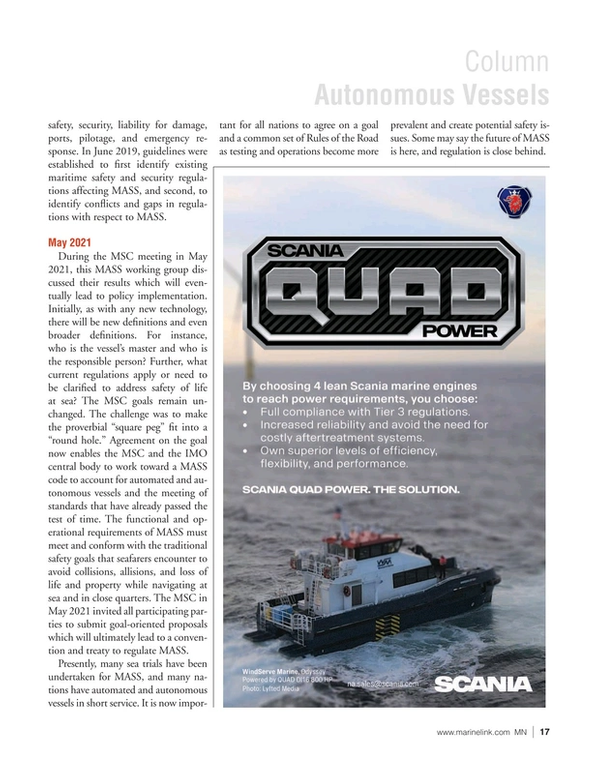
AI is Pivotal for the Future of the Autonomous Shipping
The shipping industry is responsible for around 90% of the world’s trade distribution, carrying the likes of machinery, motors, food and vehicles around the globe. However, despite being around for nearly 5,000 years, the industry has been incredibly slow to innovate. All you have to do is look at how the automotive industry has gone from the original car through to self-driving vehicles in less than 200 years to fully appreciate how behind the curve the maritime world is.
There are many parts of the shipping industry that need to be reimagined to continue to keep up with the growing demand of delivery and technology is at the heart of this, factoring into nearly every element of the shipping process.
Health and safety on board ships is the highest priority for operators, customers and crews, and technology can play a big role in reducing the rising number of collisions. Some 90% of maritime collisions occur in congested waterways, as crews struggle to navigate vessels, but this number can be drastically reduced by introducing the right data artificial intelligence (AI) model.
AI technology provides captains and crews with additional support to deal with the complex scenarios crew face on a daily basis, including low visibility. The connected technology also ensures that data is shared in real time between crew that are on and off shore, allowing the captain to make more informed decisions and introduce new processes to make everyone's lives easier while keeping up with demand.
Introducing these new technologies allows the navigational officers on board to priorities their duties and save time on tasks, like simultaneously shifting between different sides of the ship, watching the navigational tools and calculating risks the crews face on a daily basis. It’s an impossible task that requires an immense level of concentration through their duration at sea. The development models also help the captains and senior shipmates make better decisions based on the data gathered by the tech such as Orca AI. With AI developments, the level of responsibility and pressure on roles such as this will be aided greatly for the better.
Steps have already been taken to improve safety on ships, with the installation of motion sensors, but even this can be taken one step further by creating a complete hive network of sensors and readers to assist in measuring every part of the ship. This enables onboard crew to detect faults in hardware and software, harsh weather conditions, traffic updates and feed all the data back to shore where operators are able to update clients, tracking systems and even schedule future repairs or changes. The tech advancements offer crews more autonomy in their roles and get a good hand on sustainability by preventing errors and learning from previous mishaps.
In the future, AI technology will also enable stakeholders and senior leaders in the shipping industry to look at the social and economic levels of struggling regions and create new channels, production lines and ports.
Shipping companies must assume a larger responsibility for workers within their networks and focus on those from areas and environments where protection of human rights is poor. The industry should look to become a safe space for crews to operate and navigate while protecting and respecting the people, natural resources and habits.
The basic understanding of establishing AI to alleviate risk and unnecessary stress on crews and operating staff will unlock the added business potential to explore new avenues of growth. The benefits for businesses looking at this will likely show customers to take more responsibility and an alternative approach to the social responsibility of shipping as a means of delivery and operational performance. Off the back of this, the door will open for unlikely partnerships that can boost mutual benefits, profits and create a wider society throughout the industry.
Sustainability is at the forefront of the global mind and the base of sustainability is human wellbeing. Introduction of new AI technologies will give businesses better outlooks on future operations with crew changes, emissions tracking and reduction of stress.
The industry is heading in a direction where crews and senior management will be able to make instant decisions backed by hard data and take health and safety into account at all points. Intelligent ships will allow faster operations, a happier workforce and a better understanding of where we need to take the industry. For the time being, AI needs to be welcomed into the industry as a means of growth and development instead of a replacement for people. We need to look to enhance the day-to-day of onboard operators which will in-hand benefit the lines, production, levels of risk and impact on environment.
Read AI is Pivotal for the Future of the Autonomous Shipping in Pdf, Flash or Html5 edition of July 2021 Marine News
Other stories from July 2021 issue
Content
- Interview: Ben Reed, Managing Director, HamiltonJet page: 12
- The Future of MASS is Drawing Closer page: 16
- AI is Pivotal for the Future of the Autonomous Shipping page: 17
- Marine Autonomy: The Future is Being Revealed page: 20
- Moving Forward with Emissions - Is it Tiers, Tears or Fears? page: 26
- Electronic Navigational Charts: An Update and Some Issues page: 30
- Tech File: X-Series Waterjets page: 36
- Tech File: Dynamic Protective Barrier page: 38


